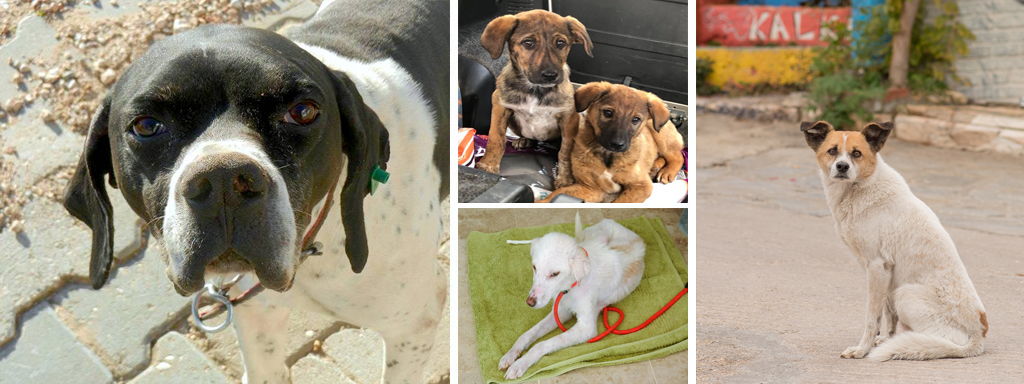
Street Animals – FAQs
Many people ask about the dogs and cats on the streets of Kalkan. This includes wanting information on feeding, healthcare, and so on and most of that information is here on the website. However we have written this quick FAQ type guide to help you get started on the main information in a short, easy format. You can browse our website to find more detailed information.
Are the dogs owned?
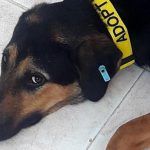 Many of the dogs you will see roaming are street dogs, either born to the streets or dumped from outlying villages or areas other than Kalkan. They will often have an ear tag to show they have been neutered and are generally on the radar of KAPSA. However, over the years, some dogs do lose their tags or they are removed for medical reasons. Some dogs are owned, but it is normal to see even owned dogs allowed to roam, especially during the day. A collar does not indicate a dog is owned.
Many of the dogs you will see roaming are street dogs, either born to the streets or dumped from outlying villages or areas other than Kalkan. They will often have an ear tag to show they have been neutered and are generally on the radar of KAPSA. However, over the years, some dogs do lose their tags or they are removed for medical reasons. Some dogs are owned, but it is normal to see even owned dogs allowed to roam, especially during the day. A collar does not indicate a dog is owned.
Are the cats owned?
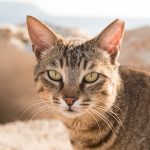
Like the dogs, a bit of both, owned and street cats. You can tell very easily if a cat has already been neutered, it will have the top of one ear snipped off. This procedure done under anaesthetic during the neutering operation and recognised world wide as the best way to assign street and feral cats as already neutered. Many owned cats also have the ear snip, so the snip is not an indicator of a street or owned cat, only that it has been neutered.
Kittens – a special note: if you see a young kitten, or hear one, please don’t try removing it unless it’s in immediate danger [on a road for example]. The mum is nearly always around and will come back for her kitten. Very young kittens are rarely dumped and the mum is often just off finding food or water. Sometimes she will be moving the kittens litter mates and will be back. If you do move because of an immediate danger, please leave it as close to where you first saw it as possible. In this way mum will know where it is and can hear it cry.
What is TNR?
TNR – Trap, Neuter, Return – is recognised by animal charities around the world as the most effective and humane way to control street and feral populations. The animal is caught, a vet health checks them and neuters [spay for females] to prevent unnecessary pregnancies. They are then released back into the area they were caught. This means the animals are on familiar territory where they usually know the best places to find food. Populations are cut down by fewer litters being born and by the natural territorial instincts helping to prevent too many new animals moving in to the area. In Kalkan and surrounding areas, the known street dogs also have an ear tag attached whenever possible, with a specific colour and number, so they can be identified in the future.
KAPSA fund this program from the donations they receive from supporters and are currently neutering around 500 animals a year from Kalkan and the surrounding villages.
Where do the animals find food?
During the summer season, there is usually plenty of food around for the street animals. Restaurants will often put out waste food for them and visitors choose to feed them too. In winter it is much harder for them, most of the restaurants have closed and the visitors have gone home. KAPSA funds a winter feeding program to ease their burden. Volunteers all across town give their time every day to ensure the animals in their ‘patch’ are fed and have fresh water. Click this link for more information on The Winter Feeding Program
What happens if the animals are injured or sick?
The vet in Kalkan [on the Kalamar road opposite Pasha Apartments] and KAPSA have worked together for several years. When one of them is alerted to a sick or injured street animal, steps are taken to get the animal to the vets as soon as possible.
What to do if you are concerned about an animal.
If you are concerned about an animal, there are several steps you can take to assist. First of all, try and get photos of it, this can help enormously with identification. If it’s a dog and you can get the ear tag number and colour [numbers can be duplicated across colours], even better. Note down where you saw the animal, again this can help with both identification and getting it help if required.
Then, as long as it’s not a life threatening emergency, please contact KAPSA by posting on the Facebook group >> https://www.facebook.com/groups/friendsofkapsa/ . Include as much information as you can, such as location, the nature of your concern and photos/tag number/colour if you got them. Someone will get in touch as soon as possible, but please be aware it may not be instant. KAPSA is run entirely by volunteers, many of whom will be working during the summer months. However someone will respond as soon as possible.
If you feel it really is an emergency, the vets can be contacted – you might need to ask a local to help if Turkish is needed, depending who is on duty at the clinic. Vets > Hasan & Lokman 0090 242 844 3188
Can we feed the animals?
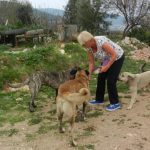 The simple answer is very much yes, the animals rely on being fed by locals and visitors all summer. For the benefit of everyone, please follow these simple tips on when and where to feed.
The simple answer is very much yes, the animals rely on being fed by locals and visitors all summer. For the benefit of everyone, please follow these simple tips on when and where to feed.
- Don’t encourage dogs or cats into restaurants or to beg at tables by feeding them there. If you have leftovers, ask the staff for a doggy bag and take the food away with you. You can then feed away from the restaurants and villas/apartments. Animals will wander in to restaurants, especially those at street level, but please don’t encourage them. Many often just lie happily at your feet, but if they bother you, just ask a member of staff to shoo them away if you are not confident doing it yourself. Please be considerate of other diners, not everyone is happy to have animals around while they are eating.
- If you are staying in rented holiday accommodation, please don’t encourage the animals in to the gardens, terraces or indoors. It is better to feed them outside on the street. Inviting animals in is not fair on the animal. It can quickly come to rely on you for food and you will be gone in a week or two. It is also unfair on the guests who will be staying there after you. They not like animals coming in expecting to be fed, or worse, have allergies to them. This could include the property owner and/or the cleaning team too.
- Treats – dogs & cats can love treats, but don’t be offended if you buy or bring with you fancy dogs treats and some turn their noses up at them. Some simply don’t like fancy foods, preferring the table scraps. Don’t worry though, there are plenty who will love those Gravy Bones or Dreamies and other such delicious morsels, you will not find them wasted.
Should we provide water?
Again, very much yes! It gets hot, especially in summer, and dehydration can very quickly become a severe problem. If you have an old tub you can use [not your villas best crockery] do put water down, outside the property. You may find one has been left near the property you are staying in, please check and fill as often as possible. The more clean cool water that is available, the better it is for the animals.
What to do if you see a distressed animal away from Kalkan?
As with animals in town, please post as much info as you can about location, photos, etc on the KAPSA Facebook group. We have a network of people in and around the villages, as well as contacts within animal charities in other towns such as Fethiye and Kas. Any concerns can usually be looked in to one way or another. Please don’t move an animal from an area and bring to Kalkan, this can sadly cause more problems than it solves.
Why can’t the animals go to a rescue centre and find homes?
Turkey does not have the large network of rescue centres, unlike the UK and across Europe. The nearest dogs home at Kas already has over 500 dogs. The chances of a dog finding a home once there are much slimmer. Sadly, it is necessary for a dog to have to go to the home. Maybe it is too young to be left on the streets to fend for itself. It could be older dog that simply hasn’t settled on the streets for whom a home could not be found. Also if dog has shown behavioural problems making it unsuitable to live a street life.
However, a settled street dog is usually happier and has a better life. There are plenty of people to keep an eye out for it, check on its welfare and it is able interact with humans as it wants. It also has a far greater chance of finding a forever home. It is seen by many people, one of whom might just be the one who falls in love and wants to offer a permanent home.
Can the animals be adopted?
Yes! Albeit that doesn’t apply to every dog [or cat]. Animals not suited to a life on the streets are better in a home environment. Dogs and cats who have always lived that life are often not suited to life in a domestic home. They are too used to having their freedom while being friendly and enjoying human company. They know their territory and are very unlikely to settle into the confines and routines of an average domestic lifestyle.
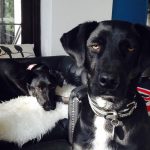 However, many are suitable and would love a home to call their own. KAPSA has advised on adoptions both in Turkey and abroad for several years. Many dogs and even a few cats have travelled to the UK, Germany, the Netherlands and France for a new life with new owners who saw them originally on the streets of Kalkan. Like a dog adopted from a rescue centre, introducing a completely new lifestyle to a former street dog can have teething troubles. New owners need to have lots of patience and time to give to their new four-legged friend. You have to help them settle in to a completely new way of life in what is an alien environment to them. Many previously adopted street dogs are now living wonderful happy lives with their new families, so many success stories!
However, many are suitable and would love a home to call their own. KAPSA has advised on adoptions both in Turkey and abroad for several years. Many dogs and even a few cats have travelled to the UK, Germany, the Netherlands and France for a new life with new owners who saw them originally on the streets of Kalkan. Like a dog adopted from a rescue centre, introducing a completely new lifestyle to a former street dog can have teething troubles. New owners need to have lots of patience and time to give to their new four-legged friend. You have to help them settle in to a completely new way of life in what is an alien environment to them. Many previously adopted street dogs are now living wonderful happy lives with their new families, so many success stories!
Adoption Process
Please be aware, there is a long process to get a street dog ready to travel should you wish to adopt abroad. It also has a considerable financial commitment attached, much more so than adopting in your own country. KAPSA volunteers who know these animals so well are very happy to help and advise should someone wish to adopt. What KAPSA cannot do is help financially, that burden is on the adopter. The animals still on the streets are a better use of our limited financial resources. To put some perspective on this, the cost of adopting just 3 dogs abroad would cover our winter feeding program helping several hundred animals across an entire winter.
We have lots of information about adoption abroad and how KAPSA play a role in that here on the website. Please read the pages linked below for details.
How can I help KAPSA with their work?
There are myriad ways to help with the work of KAPSA (click on listing for more detailed information)
- Make a donation
- Visit HQ in Kalkan to buy or donate clothes & bric-a-brac
- Donate Supplies such as flea & Tic treatments
- Attend fundraising events in Kalkan
- Run your own fund raising event at home
- Purchase one of our calendars
- Spread the word amongst your Friends & Family, especially via social media.
Remember that the work KAPSA do as a charity is concerned with the health and welfare of the street animals. It is also to provide information and education to local people and tourists about that welfare. We promote responsible, sensible and compassionate understanding of the animals. KAPSA is not a rescue centre in the way many charities in the UK and Europe are. Found animals cannot just be ‘taken in’, there is no capacity for it. Instead we have a team of people in and around Kalkan who work tirelessly and voluntarily to ensure the welfare of the animals. KAPSA is a registered charity in both Turkey and the UK.
